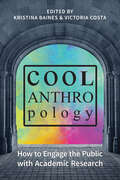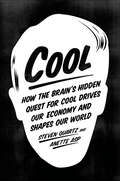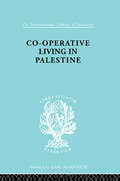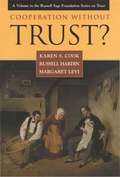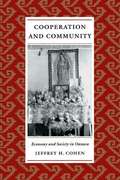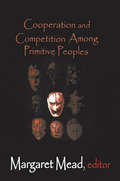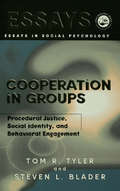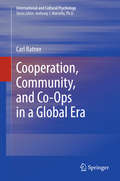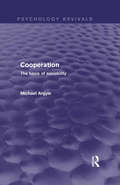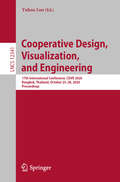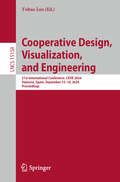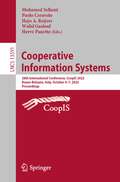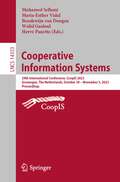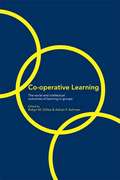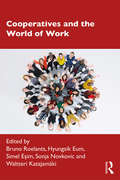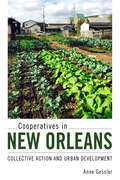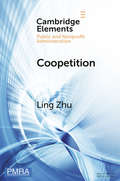- Table View
- List View
Conviviality in Burgaz: Living, Loving and Fighting on a Diverse Island of Istanbul
by Deniz N. DuruThis open access book tells stories of conviviality, solidarity, and everyday management of conflicts and tensions, by building on original, long-term ethnographic research (fourteen months in 2009-2010, followed by fieldwork trips until now) on Burgaz, an island home to more than twenty ethnic and religious groups from different socio-economic backgrounds. The island provides an excellent case study of post-Ottoman conviviality, as the homogenisation process during the nation-building stage of modern Turkey triggered migrations from the island, especially of non-Muslims, yet the island’s population retains elements of its Byzantine and Ottoman diversity. The book explores the islanders’ representation of diversity through ethnographic research, media analysis and interviews, and shifts the analytical framework of Post-Ottoman plurality from “coexistence/toleration” to that of conviviality. The author critically engages with the literature on multiculturalism and cosmopolitanism andconceptualises conviviality as both living together in diversity as shared ways of living as well as living with difference. The book further explores the relationship between conviviality, solidarity, coexistence/toleration, intoleration and nationalism.This is an open access book.
Cool Anthropology: How to Engage the Public with Academic Research
by Victoria Costa Kristina BainesThrough a series of case studies by leading anthropologists, Cool Anthropology highlights the many different approaches that scholars have used to engage the public with their research. Editors Kristina Baines and Victoria Costa showcase efforts to make meaningful connections with communities outside the walls of academia, moving anthropological thinking beyond the discipline. Through their focus on collaborative efforts, contributors push against the exclusivity of "knowledge production" to ask how engaging communities as both producers and consumers of academic research helps to promote anthropology better and do anthropology better.
Cool Britannia and Multi-Ethnic Britain: Uncorking the Champagne Supernova (Routledge Research in Race and Ethnicity)
by Jason ArdayCool Britannia and Multi-Ethnic Britain: Uncorking the Champagne Supernova attempts to move away from the melancholia of Cool Britannia and the discourse which often encases the period by repositioning this phenomenon through an ethnic minority perspective. In March 1997, the front page of the magazine Vanity Fair announced ‘London Swings! Again!’ This headline was a direct reference to the swinging London of the 1960s – the English capital which became the era-defining epicentre of the world for its burgeoning rock and pop music scene, with its daring new youth culture, and the boutique fashion houses of Carnaby Street captured most indelibly by the Mods, Rockers, and psychedelic hippies of the time. In the 1990s this renewed interest in the swinging 60s seemed to reinvigorate popular culture, after a global period in the 1980s which would see the collapse of traditional communism and the ending of Cold War, while ushering in the beginnings of a new technological age spearheaded by Apple, Microsoft, and IBM. The dawn of the 1990s meant that peace and love would once again reign supreme, with Britannia being at the forefront of ‘cool’ again. Godfathers of the Mancunian Rock scene New Order would declare ‘Love had the world in motion’ and, for a fleeting period, Britain was about to encounter its second coming as the cultural epicentre of the world. Although history proffers a period of utopia, inclusion, and cultural integration, the narrative alters considerably when exploring this euphoric period through a discriminatory and racialised lens. This book repositions the ethnic minority–lived experience during the 1990s from the societal and political margins to the centre. The lexicon explored here attempts to provide an altogether different discourse that allows us to reflect on seminal and racially discriminatory episodes during the 1990s that subsequently illuminated the systemic racism sustained by the state. The Cool Britannia years become a metaphoric reference point for presenting a Britain that was culturally splintered in many ways. This book utilises storytelling and auto-ethnography as an instrument to unpack the historical amnesia that ensues when unpacking the racialised plights of the time.
Cool Conduct: The Culture of Distance in Weimar Germany
by Helmut LethenCool Conduct is an elegant interpretation of attitudes and mentalities that informed the Weimar Republic by a scholar well known for his profound knowledge of this period.
Cool Nations: Media and the Social Imaginary of the Branded Country (Routledge Advances in Sociology)
by Katja ValaskiviNation branding is the most recent feature of imagined nation-making in the history of nations. Facing global competition, national decision-makers aim to distinguish their countries from others by means of branding. Quite a few nations have considered the term ‘cool’ suitable for describing some essence of their country’s brand. Cool Nations. Media and the Social Imaginary of the Branded Country traces the mediated ways in which the transnational idea of "cool" has circulated from popular culture, fashion, and marketing into describing nations. The book explores the commodification of the nation, the shift to a promotional political culture, and the role of media in contributing to the circulation of the idea of the Cool Nation. The social imaginary of nation branding takes its theory and practices from marketing, unlike earlier imaginations based on ideas of democracy or citizenship. Cool Nations argues that "cool" is one of the vehicles through which the commodification of nations takes place.
Cool: How the Brain's Hidden Quest for Cool Drives Our Economy and Shapes Our World
by Steven Quartz Anette Asp“This engrossing history merges evolutionary biology and economics to explain our spending habits” and show how coolness is at the heart of consumerism (Mental Floss).We live in a world of conspicuous consumption, where the things we buy not only satisfy our needs, but also communicate our values, identities, and aspirations. In Cool, Steven Quartz and Anette Asp bring together groundbreaking findings in neuroscience, economics, and evolutionary biology to show how our concepts of “cool”—be it designer jeans, smartphones, or craft beer—help drive the global economy.Cool puts forth a provocative theory of consumerism based on our brain’s innate status-seeking and “social calculator”. The authors highlight the underlying processes that guide our often-unconscious decision making. They also pull back the curtain on “choice architects” who design store interiors, as well as “coolhunters” who scour Berlin and Tokyo for the latest trends.Quartz and Asp follow the evolution of “cool consumption” from the mid-twentieth century through the emergence of the Internet in the 1990s, finally unpacking the social motivations behind today’s hip, ethical consumption. Taking us from Norman Mailer to normcore, Cool is surprising at every turn, and will forever change the way you think about money, status, and your next purchase.
Coop Living Palestine Ils 106 (International Library of Sociology)
by Henrik F. InfieldFirst published in 1998. Routledge is an imprint of Taylor & Francis, an informa company.
Cooperation Without Trust?
by Margaret Levi Russell Hardin Karen S. CookSome social theorists claim that trust is necessary for the smooth functioning of a democratic society. Yet many recent surveys suggest that trust is on the wane in the United States. Does this foreshadow trouble for the nation? In Cooperation Without Trust? Karen Cook, Russell Hardin, and Margaret Levi argue that a society can function well in the absence of trust. Though trust is a useful element in many kinds of relationships, they contend that mutually beneficial cooperative relationships can take place without it. Cooperation Without Trust? employs a wide range of examples illustrating how parties use mechanisms other than trust to secure cooperation. Concerns about one’s reputation, for example, could keep a person in a small community from breaching agreements. State enforcement of contracts ensures that business partners need not trust one another in order to trade. Similarly, monitoring worker behavior permits an employer to vest great responsibility in an employee without necessarily trusting that person. Cook, Hardin, and Levi discuss other mechanisms for facilitating cooperation absent trust, such as the self-regulation of professional societies, management compensation schemes, and social capital networks. In fact, the authors argue that a lack of trust—or even outright distrust—may in many circumstances be more beneficial in creating cooperation. Lack of trust motivates people to reduce risks and establish institutions that promote cooperation. A stout distrust of government prompted America’s founding fathers to establish a system in which leaders are highly accountable to their constituents, and in which checks and balances keep the behavior of government officials in line with the public will. Such institutional mechanisms are generally more dependable in securing cooperation than simple faith in the trustworthiness of others. Cooperation Without Trust? suggests that trust may be a complement to governing institutions, not a substitute for them. Whether or not the decline in trust documented by social surveys actually indicates an erosion of trust in everyday situations, this book argues that society is not in peril. Even if we were a less trusting society, that would not mean we are a less functional one. A Volume in the Russell Sage Foundation Series on Trust
Cooperation and Community: Economy and Society in Oaxaca
by Jeffrey H. CohenIn the villages and small towns of Oaxaca, Mexico, as in much of rural Latin America, cooperation among neighbors is essential for personal and community survival. It can take many forms, from godparenting to sponsoring fiestas, holding civic offices, or exchanging agricultural or other kinds of labor. This book examines the ways in which the people of Santa Ana del Valle practice these traditional cooperative and reciprocal relationships and also invent new relationships to respond to global forces of social and economic change at work within their community. Based on fieldwork he conducted in this Zapotec-speaking community between 1992 and 1996, Jeffrey Cohen describes continuities in the Santañeros' practices of cooperation, as well as changes resulting from transnational migration, tourism, increasing educational opportunities, and improved communications. His nuanced portrayal of the benefits and burdens of cooperation is buttressed by the words of many villagers who explain why and how they participate-or not-in reciprocal family and community networks. This rich ethnographic material offers a working definition of community created in and through cooperative relationships.
Cooperation and Competition Among Primitive Peoples
by Margaret MeadIn many respects, this volume is a pioneer effort in anthropological literature. It remains firmly part of the genre of cooperative research, or "interdisciplinary research," though at the time of its original publication that phrase had yet to be coined. Additionally, this work is more theoretical in nature than a faithful anthropological record, as all the essays were written in New York City, on a low budget, and without fieldwork. The significance of these studies lies in the fact that Cooperation and Competition Among Primitive Peoples was the first attempt to think about the very complex problems of cultural character and social structure, coupled with a meticulous execution of comparative study.
Cooperation and Governance in International Trade: The Strategic Organizational Approach (Princeton Legacy Library)
by Beth V. Yarbrough Robert M. YarbroughInternational trade liberalization historically has taken many organizational forms--unilateral, bilateral, minilateral, and multilateral. Given the proliferation of normative views about which of these should be pursued, economists and political scientists have devoted surprisingly little attention to the reasons for the observed variation in the chosen forms. This book is the first to develop a single theoretical framework to account for past liberalization practices and also to anticipate ongoing changes in the international organization of trade policy. Growing out of a multidisciplinary effort combining economics, politics, organization, and law, the book's strategic organizational approach will interest students of trade, international relations, or institutional arrangements. <p><p>Central to the strategic organizational approach is the view that organizational variety reflects alternate governance structures used to facilitate and enforce agreements. Among the successes of the approach are explanations of unilateral liberalization by nineteenth-century Britain, U.S. governance of multilateral liberalization under the early postwar GATT, growing use of bilateral governance to limit nontariff trade barriers, and anticipation of major moves toward minilateral governance, such as Europe/1992 and the Canada-U.S. Free-Trade Agreement.
Cooperation in Groups: Procedural Justice, Social Identity, and Behavioral Engagement (Essays in Social Psychology)
by Tom Tyler Steven BladerThis important new book explores the psychological motives that shape the extent and nature of people's cooperative behavior in the groups, organizations and societies to which they belong. Individuals may choose to expend a great deal of effort on promoting the goals and functioning of the group, they may take a passive role, or they may engage in behaviors targeted towards harming the group and its goals. Such decisions have important implications for the group's functioning and viability, and the goal of this book is to understand the factors that influence these choices.
Cooperation in Modern Society: Promoting the Welfare of Communities, States and Organizations (Routledge Research International Series in Social Psychology #Vol. 1)
by Tom R. Tyler Mark Van Vugt Mark Snyder Anders BielWhy do so many people volunteer to help others in need in society today? What makes people give up the convenience of driving their car to benefit a better environment? And why are citizens, in general, quite prepared to pay taxes to ensure adequate health care, and support for the elderly and unemployed? These are examples of a more fundamental question addressed in this book: why do people cooperate for the welfare of their community, state, or organization? Cooperation in Modern Society is a unique collection of contributions from internationally reputed scholars across the social sciences.
Cooperation, Community, and Co-Ops in a Global Era (International and Cultural Psychology)
by Carl RatnerGlobalization pressures have made cooperation on a global scale both necessary and possible. But cooperation is not easy in a world dominated by individual, cultural, and national selfish interests. The opposition to cooperation means that cooperation is not natural, but must be instituted through an intellectual and social struggle against countervailing forces. This book discusses issues that are necessary to describe the nature of cooperation and how it can be promoted as a social and ethical ideal amidst a sea of competing interests. Dr. Ratner uses the framework of cooperativism, that is the system of social institutions, social philosophy, cultural psychology and politics that promotes cooperation, as a starting point. Elements of cooperativism are derived from a rigorous analysis of various sources, including the needs of tendencies of human culture and human psychology.
Cooperation: The basis of sociability (Psychology Revivals)
by Michael ArgyleIs human nature cooperative? Man is often said to be a social animal – but what does that mean? Michael Argyle believed that one of the most important components – our capacity to cooperate – had been overlooked and indeed that the whole notion of cooperation had not been properly understood. In this book, originally published in 1991, the author showed he was critical of earlier approaches, and put forward a new and extended understanding of what cooperation consists of, showing the form it took in different relationships and its origins in evolution and socialisation. He offered new solutions to intergroup and other social problems and took a new look at language and communication as a cooperative enterprise.
Cooperative Design, Visualization, and Engineering: 17th International Conference, CDVE 2020, Bangkok, Thailand, October 25–28, 2020, Proceedings (Lecture Notes in Computer Science #12341)
by Yuhua LuoThis book constitutes the proceedings of the 17th International Conference on Cooperative Design, Visualization, and Engineering, CDVE 2020, held in Bangkok, Thailand, in October 2020.*The 33 full papers and 7 short papers presented were carefully reviewed and selected from 74 submissions. The achievement, progress and future challenges are reported in areas such as health care, industrial design, banking IT systems, cultural activities support, operational maritime cybersecurity assurance, emotion communication, and social network data analytics. * The conference was held virtually due to the COVID-19 pandemic.
Cooperative Design, Visualization, and Engineering: 18th International Conference, CDVE 2021, Virtual Event, October 24–27, 2021, Proceedings (Lecture Notes in Computer Science #12983)
by Yuhua LuoThis book constitutes the proceedings of the 18th International Conference on Cooperative Design, Visualization, and Engineering, CDVE 2021, held in October 2021. Due to COVId-19 pandemic the conference was held virtually.The 25 full papers and 9 short papers presented were carefully reviewed and selected from 69 submissions. The achievement, progress and future challenges are reported in areas such as health care, industrial design, banking IT systems, cultural activities support, operational maritime cybersecurity assurance, emotion communication, and social network data analytics.
Cooperative Design, Visualization, and Engineering: 20th International Conference on Cooperative Design, Visualization and Engineering, CDVE 2023, Mallorca, Spain, October 1–4, 2023, Proceedings (Lecture Notes in Computer Science #14166)
by Yuhua LuoThis book constitutes the proceedings of the 20th International Conference on Cooperative Design, Visualization, and Engineering, CDVE 2023, held in Palma de Mallorca, Spain, in October 2023. The 20 full papers and 6 short papers presented were carefully reviewed and selected from 62 submissions. The papers cover a wide application spectrum including architecture, engineering and construction (AEC), apace craft building, heavy industry, robotics, tourism, education, community building, medical supply industry, commerce.
Cooperative Design, Visualization, and Engineering: 21st International Conference, CDVE 2024, Valencia, Spain, September 15–18, 2024, Proceedings (Lecture Notes in Computer Science #15158)
by Yuhua LuoThis book constitutes the proceedings of the 21st International Conference on Cooperative Design, Visualization, and Engineering, CDVE 2024, held in Valencia, Spain, in September 2024. The 34 full papers and 5 short papers presented were carefully reviewed and selected from 74 submissions. The papers cover a wide application spectrum including AI technology, cooperative engineering, basic technologies for cooperative applications, IOT internet of things, block chain technology, sensor networks, and more.
Cooperative Information Systems: 28th International Conference, CoopIS 2022, Bozen-Bolzano, Italy, October 4–7, 2022, Proceedings (Lecture Notes in Computer Science #13591)
by Paolo Ceravolo Walid Gaaloul Hajo A. Reijers Hervé Panetto Mohamed SellamiThis volume LNCS 13591 constitutes the proceedings of the International Conference on Cooperative Information Systems, CoopIS 2022, collocated with the Enterprise Design, Operations and Computing conference, EDOC 2022, in October 2022 in Bozen-Bolzano, Italy. The 15 regular papers presented together with 5 research in progress papers were carefully reviewed and selected from 68 submissions. The conference focuses on technical, economical, and societal aspects of distributed information systems at scale. As said, this 28th edition was collocated with the 26th edition of the Enterprise Design, Operations and Computing conference, EDOC 2022, and its guiding theme was "Information Systems in a Digital World“.
Cooperative Information Systems: 29th International Conference, CoopIS 2023, Groningen, The Netherlands, October 30–November 3, 2023, Proceedings (Lecture Notes in Computer Science #14353)
by Maria-Esther Vidal Walid Gaaloul Hervé Panetto Boudewijn Van Dongen Mohamed SellamiThis book constitutes the refereed proceedings of the 29th International Conference on Cooperative Information Systems, CoopIS 2023, held in Groningen, The Netherlands, during October 30–November 3, 2023. The 21 regular papers and 10 work-in-progress papers included in this book were carefully reviewed and selected from 100 submissions. They were organized in topical sections as follows: Knowledge Engineering; Deployment and Migration in CISs; Security and Privacy in CISs; Process Modeling; Process Analytics; Human Aspects and Social Interaction in CISs; and Work in Progress.
Cooperative Learning: The Social and Intellectual Outcomes of Learning in Groups
by Robyn M. Gillies Adrian F. AshmanThis book recognizes the importance of cooperative learning, in contrast to the traditional classroom, as an effective approach to learning. Its coverage of the subject ranges across the educational spectrum, from pre-school years to university, and offers a fresh perspective on a topic that has gained increasing interest worldwide.With contributions from an international panel of leading experts in the field, this engaging text succeeds in providing key insights, linking the theories that underpin the study of group dynamics to their practical application in the classroom. It presents a comprehensive overview of this alternative educative approach, illustrating how cooperative learning experiences can promote socialisation and friendships, and facilitate learning. The editors assemble a range of well-researched essays, covering such aspects as:* The importance of teacher and student interaction* Small group, virtual and non-virtual teaching environments* Assessment practices for measuring the outcomes of individual and group progress* The effect of cooperative learning on relationships amongst students with diverse cultural, social and learning needs.Illustrated with practical examples throughout, this book will be a crucial read for teacher educators, educational psychologists, student teachers, academics and researchers who want to realize the significant potential of cooperative learning in all educational settings.
Cooperatives and the World of Work
by Sonja Novkovic Bruno Roelants Hyungsik Eum Simel Esim Waltteri KatajamäkiAs the world of work and jobs is more uncertain than ever because of various trends impacting it, including the rise of robotics and the gig economy, Cooperatives and the World of Work furthers the debate on the future of work, sustainable development, and the social and solidarity economy of which cooperatives are a fundamental component. Throughout the book, the authors, who are experts in their respective fields, do not limit themselves to praising the advantages of the cooperative model. Rather, they challenge the narrow understanding of cooperatives as a mere business model and raise debate on the more fundamental role that cooperatives play in responding to social changes and in changing society itself. The book is unique in tracing the historical connection between cooperatives and the world of work since the end of the First World War and the recent shifts and restructuring in enterprise and the workplace. It presents a redefinition of the very concept of work, focusing on organizational innovation. This book is published in recognition of 100 years of the International Labour Organization, and gathers together research from leading experts who were brought together at an event co-hosted by the International Co-operative Alliance (ICA) and the International Labour Organization (ILO).
Cooperatives in New Orleans: Collective Action and Urban Development
by Anne GesslerCooperatives have been central to the development of New Orleans. Anne Gessler asserts that local cooperatives have reshaped its built environment by changing where people interact and with whom, helping them collapse social hierarchies and envision new political systems. Gessler tracks many neighborhood cooperatives, spanning from the 1890s to the present, whose alliances with union, consumer, and social justice activists animated successive generations of regional networks and stimulated urban growth in New Orleans. Studying alternative forms of social organization within the city’s multiple integrated spaces, women, people of color, and laborers blended neighborhood-based African, Caribbean, and European communal activism with international cooperative principles to democratize exploitative systems of consumption, production, and exchange. From utopian socialist workers’ unions and Rochdale grocery stores to black liberationist theater collectives and community gardens, these cooperative entities integrated marginalized residents into democratic governance while equally distributing profits among members. Besides economic development, neighborhood cooperatives participated in heady debates over urban land use, applying egalitarian cooperative principles to modernize New Orleans’s crumbling infrastructure, monopolistic food distribution systems, and spotty welfare programs. As Gessler indicates, cooperative activists deployed street-level subsistence tactics to mobilize continual waves of ordinary people seizing control over mainstream economic and political institutions.
Coopetition: How Interorganizational Collaboration Shapes Hospital Innovation in Competitive Environments (Elements in Public and Nonprofit Administration)
by Ling ZhuPublic service innovation, defined as the adoption of new technology and methods of service delivery, is at the heart of public management research. Scholars have long studied public and private sector innovation as distinctive phenomena, arguing that private sector innovation aims to increase firms' competitive advantage, while public sector innovation purports to improve governance and performance. The public-private dichotomy overlooks the complex way how organizations interact with each other for service delivery. Public services are increasingly delivered through the web of collaborative networks, in which organizations compete and cooperate simultaneously. This Element explores how coopetition, namely the simultaneous presence of competition and collaboration, shapes innovation in the health care sector. Analyzing panel data of 4,000+ American hospitals from 2008 to 2017, this Element finds evidence that coopetition catalyzes the technology and service process innovation and offers practical implications on managing innovation in competitive environments.

